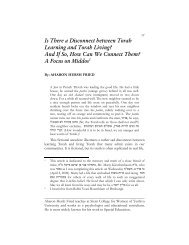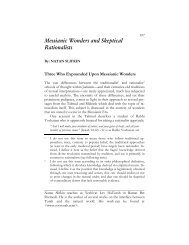A Discussion with Rabbi Shmuel Kamenetsky on âSSAâ - Hakirah.org
A Discussion with Rabbi Shmuel Kamenetsky on âSSAâ - Hakirah.org
A Discussion with Rabbi Shmuel Kamenetsky on âSSAâ - Hakirah.org
Create successful ePaper yourself
Turn your PDF publications into a flip-book with our unique Google optimized e-Paper software.
A <str<strong>on</strong>g>Discussi<strong>on</strong></str<strong>on</strong>g> <str<strong>on</strong>g>with</str<strong>on</strong>g> <str<strong>on</strong>g>Rabbi</str<strong>on</strong>g> <str<strong>on</strong>g>Shmuel</str<strong>on</strong>g> <str<strong>on</strong>g>Kamenetsky</str<strong>on</strong>g> <strong>on</strong> “SSA” : 33“Every<strong>on</strong>e is capable of overcoming an inclinati<strong>on</strong> that is prohibitedby the Torah,” 3 said Rav <str<strong>on</strong>g>Kamenetsky</str<strong>on</strong>g>. Change is not <strong>on</strong>lypossible, but, according to the Rosh Yeshiva, it is imperative andcrucial for every G-d–fearing pers<strong>on</strong>. The Rosh Yeshiva recognizestwo distinct types of “change” (which he used interchangeably <str<strong>on</strong>g>with</str<strong>on</strong>g>the word “c<strong>on</strong>trol.”) To accomplish such change, he said, “counselingis the best thing—if a pers<strong>on</strong> is willing to engage in it.” Twoseparate and distinct types of change relevant to mishkav zacharmay occur: (a) virtual eliminati<strong>on</strong> of the thoughts, feelings, and behavior,or (b) significant decrease of the desire, combined <str<strong>on</strong>g>with</str<strong>on</strong>g>knowledge of the tools necessary to redirect <strong>on</strong>e’s feelings if the desirereturns. He indicated that all of us face challenges of <strong>on</strong>e sort oranother but as humans we have been given by our Creator the capacityto overcome them. In March 2000, he forcefully expressedthis sentiment when he wrote in a letter endorsing JONAH, “Anythingthat the Torah forbids, the human being is able to c<strong>on</strong>trol.”The Rosh Yeshiva further indicated that Hashem does not playcruel tricks <strong>on</strong> His creatures, nor does He create impossible situati<strong>on</strong>sfor a human being that would cause the individual to violate aTorah prohibiti<strong>on</strong>. The Gemara (Avodah Zarah 3a) affirms thisc<strong>on</strong>cept: “Because the Holy One, blessed be He, does not deal imperiously<str<strong>on</strong>g>with</str<strong>on</strong>g> His creatures.”Rav <str<strong>on</strong>g>Kamenetsky</str<strong>on</strong>g> spoke emphatically to the questi<strong>on</strong> of changeof sexual orientati<strong>on</strong> in the haskamah (approbati<strong>on</strong>) he wrote afterreviewing my book: 434that every [inborn] drive has some form of outlet that is acceptable <str<strong>on</strong>g>with</str<strong>on</strong>g>inTorah.“Overcoming” in this c<strong>on</strong>text is best thought of <strong>on</strong> a spectrum rangingfrom total eradicati<strong>on</strong> of the inclinati<strong>on</strong> and resoluti<strong>on</strong> of the previousunresolved feelings leading to the behavior to simply c<strong>on</strong>trolling the behavior.The outcome may depend up<strong>on</strong> several factors such as the pers<strong>on</strong>almotivati<strong>on</strong> and will to overcome unwanted SSA, the amount ofwork d<strong>on</strong>e by a pers<strong>on</strong> in counseling, the amount of co-morbid emoti<strong>on</strong>alissues the individual presents <str<strong>on</strong>g>with</str<strong>on</strong>g> (e.g., depressi<strong>on</strong>, Obsessive-Compulsive Disorder, addicti<strong>on</strong>s etc.), the length of time the pers<strong>on</strong> engagedin homosexual ideati<strong>on</strong> or behavior, etc.Light in the Closet: Torah, Homosexuality, and the Power to Change (LosAngeles: Red Heifer Press, 2008)
















